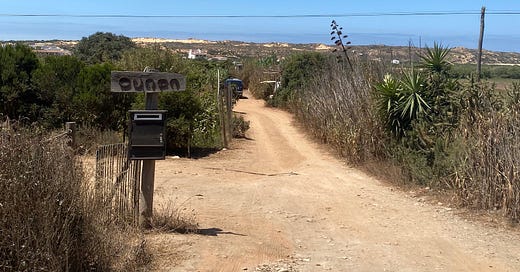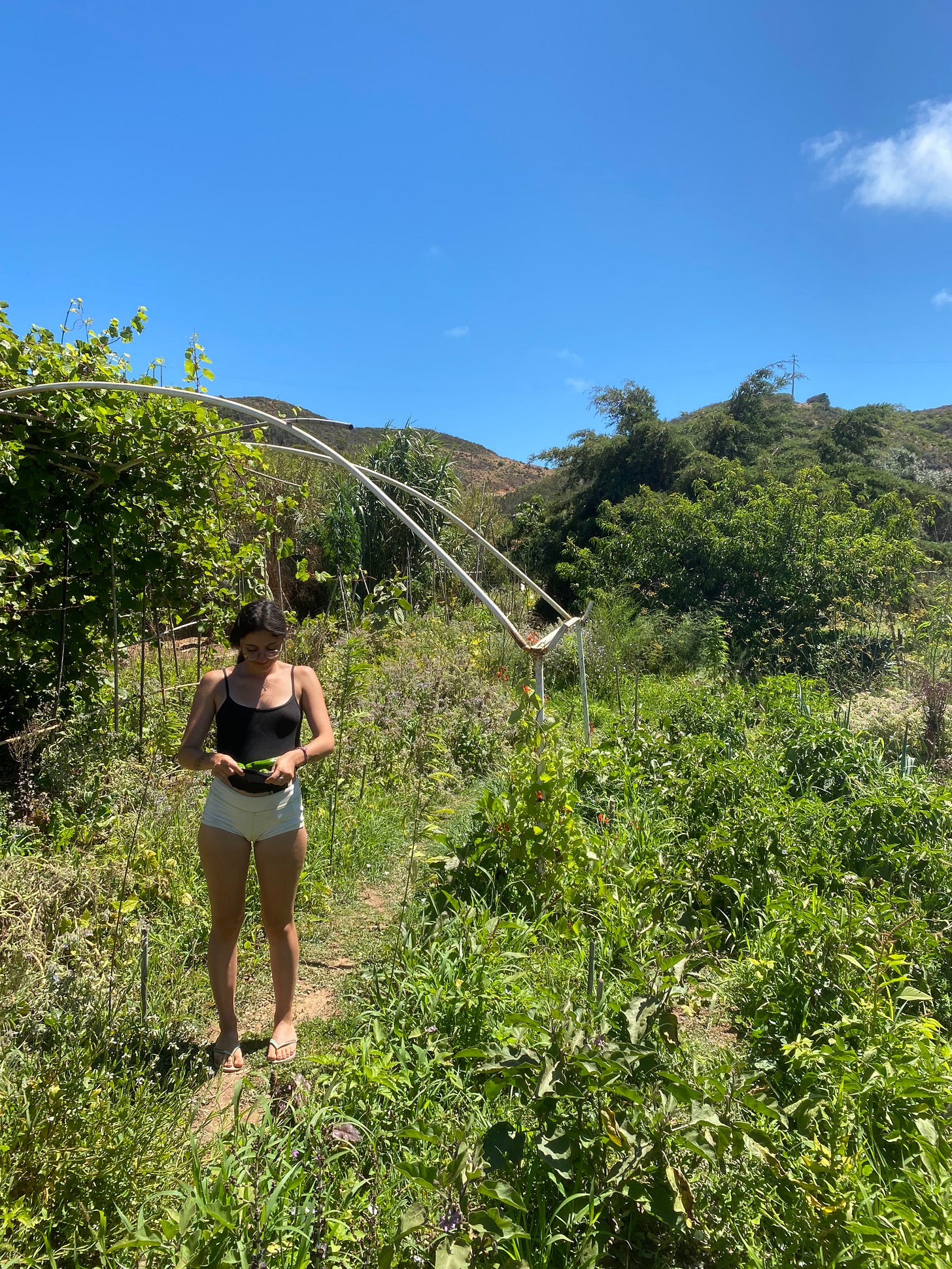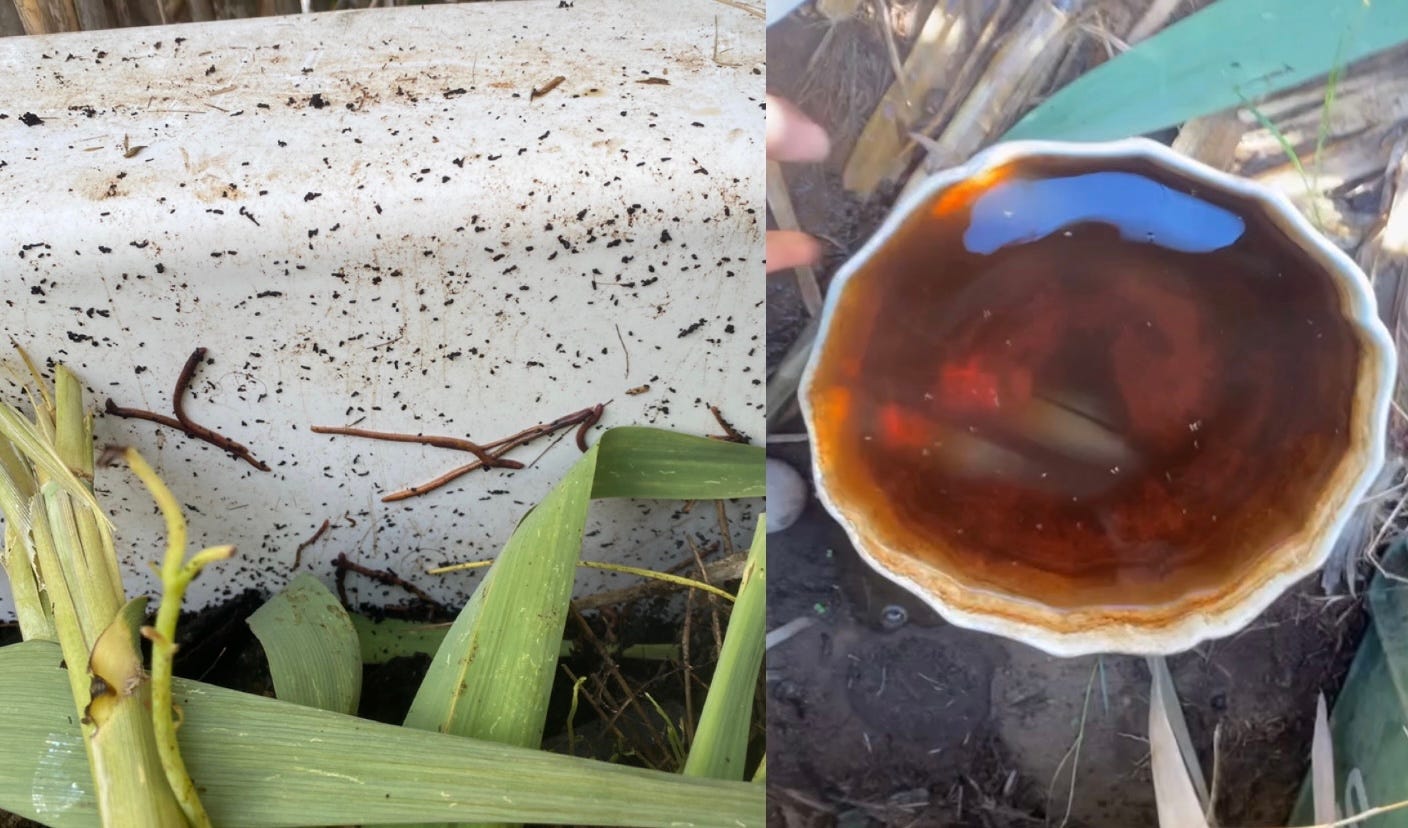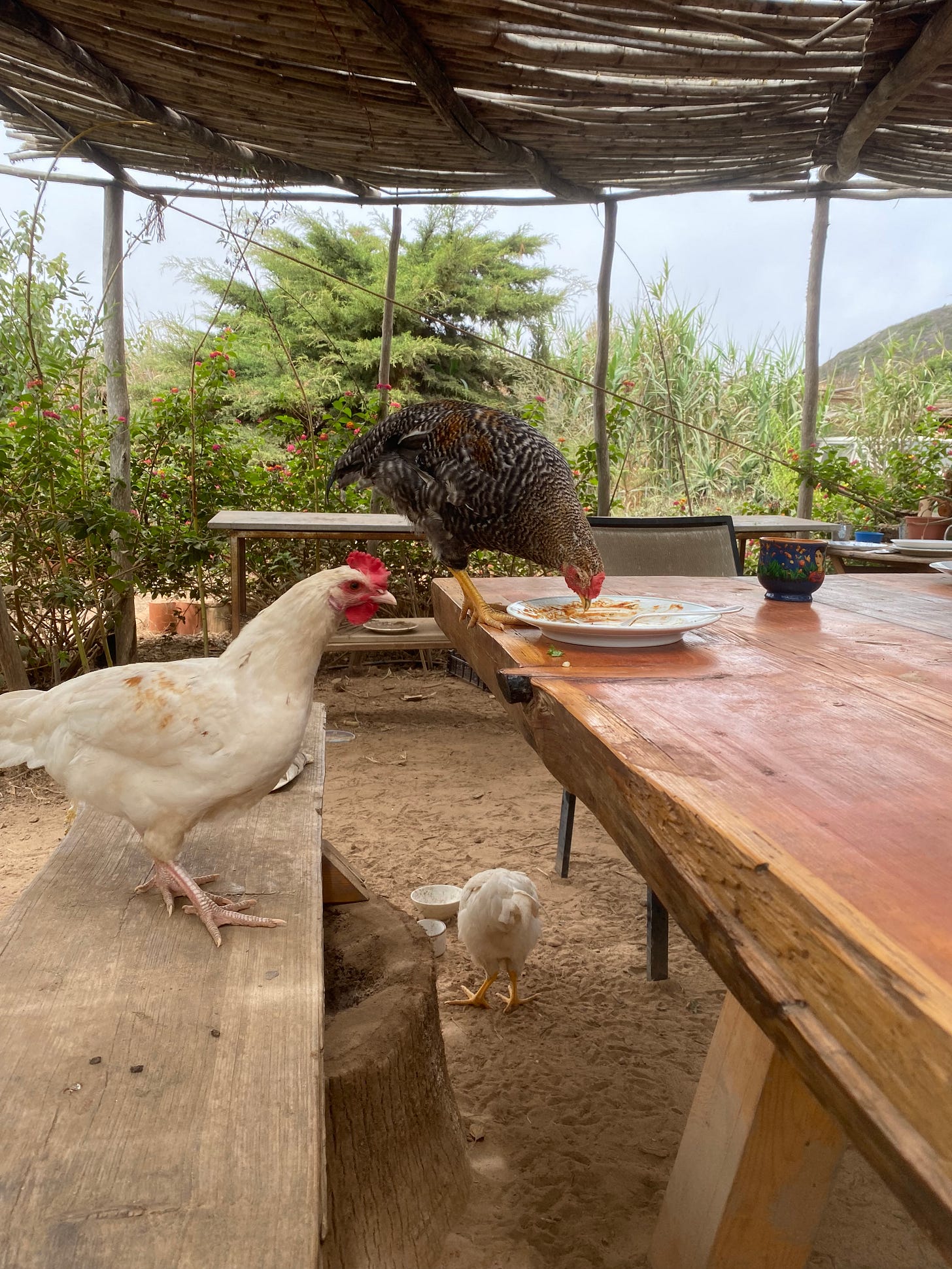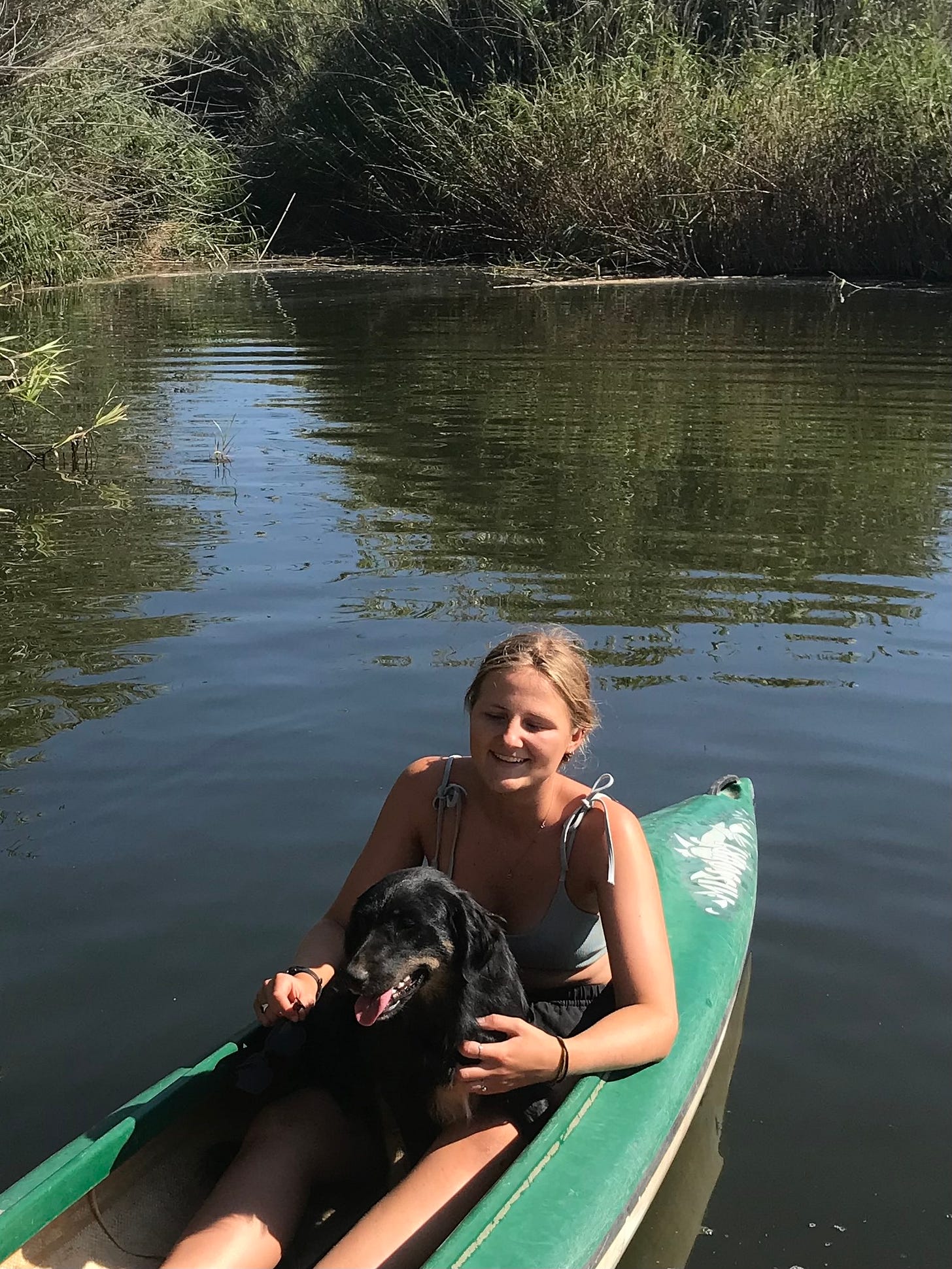WWOOFing in Portugal
Living out my fantasy of joining a secluded eco-community and why I no longer want to sell all my belongings and move to the rainforest
Last summer, I spent a month volunteering as a WWOOFer (Willing Worker On Organic Farms) on a self-sustaining farm in the Portuguese Algarve. Besides it being one of the best experiences of my life, it was also one of the most bewildering ones. While I have never lived more sustainably than I did then, I also never lived without so many taken-for-granted basic comforts. A sustainable lifestyle does not necessarily mean living primitively, but that was definitely what Monte da Cunca went for. It truly felt like a different world, and I doubt I can ever accurately describe what it felt like to be living there - yet, I will try to do just that in this post haha. Also, expect some cool nature-based farming practices! Curious about the locations and more photos? Check out my polarsteps for the trip! Or this insta post or story highlight.
Before you read this post, there are two things you should know about me. 1) I’m suuuuuuper susceptible to documentaries, and 2) I am a huge romanticiser of living with no belongings in a hut somewhere in the middle of the jungle. To back these claims up, I’ll describe the two documentaries that led me to Monte da Cunca (MdC). It starts with episode three of Down to Earth with Zac Efron, where he visits the eco-community Punta Mona in Costa Rica. Seeing those smiling people living in a welcoming community in a rainforest, caring for and living off the land, enjoying nature and the sun - I felt so envious of the simplicity of their lifestyle and the beauty of not needing much. I told myself that one day, I want to live like that.
The second documentary that attests to my susceptibility is the Biggest Little Farm, which follows a couple that starts a regenerative farm in LA. With traditional agriculture being super harmful to the planet, their way of farming in harmony with nature was so refreshing and interesting, I hung onto every word they said. That night, as I was trying to fall asleep, I realised that to truly absorb that knowledge there was no better way than to experience it myself. So, the first thing next morning, before having even left my bed, I set out to find a self-sustaining farm (preferably one offering a community life like that of Punta Mona) where I could spend my summer. I soon found MdC in Carrapateira, which ticked all the boxes.
“Here is revealed a new and unexpected view of the world. Through hard work, a life without a watch. With the calm and harmony of nature bloom satisfaction and joy.” Reading this again now, I laugh at my own naivety. I took this sentence so literally. I thought we really weren’t allowed to wear watches on the farm and that we would just navigate time by our body clocks and the sun haha. Luckily, I soon realised that I could safely bring out my watch and start working on that beautiful watch tan. The post also mentioned: “Free time to enjoy nature, beach, kayaking, solar energy, whatever you like to do!” Everything in the post just made me so so excited to go there. The secludedness and back-to-nature idea was perfect - I could finally live out that romanticised idea of escaping capitalist society and emerging into simple farm life!!! I applied for the position and went downstairs for breakfast.
From excited to scared to excited
I had just spent a week with friends in France when I flew to Sevilla (Spain). From there I took a 7-hour bus to Lagos (Portugal), and another 1-hour bus to Vila do Bispo. As the farm was located just outside of the small village of Carrapateira, there was no public transportation to the farm, meaning I had to hitchhike the last 22km. I was picked up by a really cute elderly Spanish couple. As they barely spoke English, our communication mostly involved hand signals and polite ‘no clue what you just said, but sure’ nods haha. They dropped me off at the MdC guesthouse, where Klaus (the owner of MdC, together with his wife Dania) pulled up in his very banged-up, rusty van, which reminded me so much of the vans I had driven in Australia during farm work. He drove us to the farm just a few hundred meters down the road, and turned onto Cunca’s dusty ‘driveway’.
Immediately, four dogs ran towards us. Over the course of that month, being greeted by the dogs would become one of my favourite things about the farm, but at this time all I could register was the chaotic, unorganised and neglected look of the place. And the dust, geez. When I got out of the car, Lua forced me to accept the conditions immediately, placing her dusty paws on my beige shorts. I was actually quite thankful for that, nice way to break the barrier of getting dirty haha. Klaus gave me a quick tour of the farm, after which I wrote in my journal “A few words come to mind: dust, broken cars, random objects, animal feces, chaos, vegetables, dust, primitivity, dust, even more random objects” - I think I captured the place perfectly.
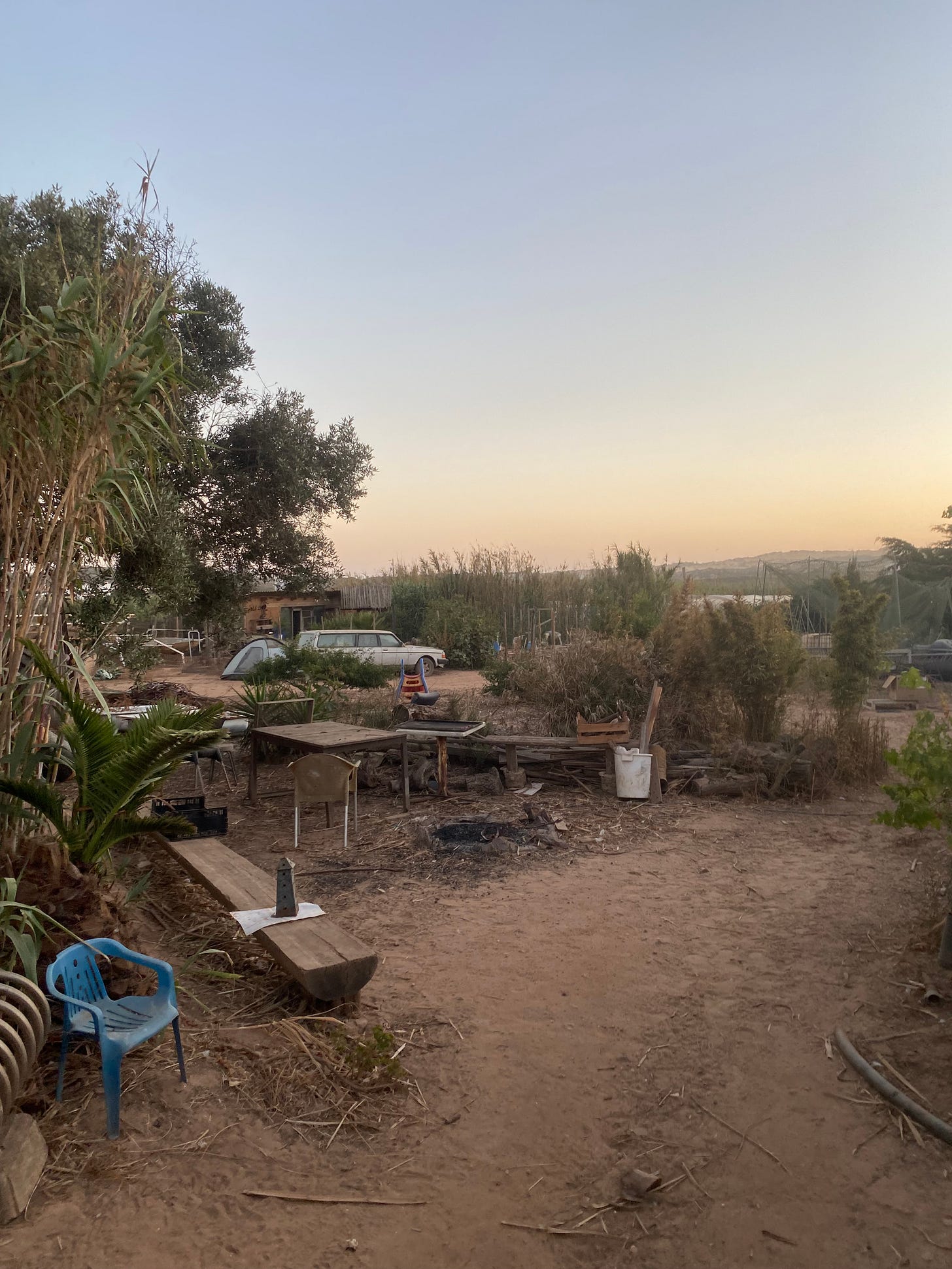
I then met the other WWOOFers (4 girls, 3 guys) and a guy who had lived there for 12 years. The latter was Thomas, our ‘cook’ (photo 2 - only the people in pic 6,7,9 weren’t at the farm anymore). His first sentence to me was “Oh you’re from the Netherlands? The first thing I’ll do when I get to the Netherlands is kill the royal family. Prins Bernhard started the Illuminati you know.” Within the next 5 minutes he then also explained how the FBI has chipped every human in the world and how CO2 is actually beneficial for the planet. I glanced at the others, who didn’t seem the least bit fazed by his theories.
The rest of the afternoon was filled with shock after shock. Being there was so exciting, but also overwhelming. It was so primitive, even more than I could have ever imagined. The kitchen was filthy, we were not allowed to use soap while doing dishes nor for washing our hands, there was a bat in our dorm (was I going to be covid-20 patient zero??), everything was incredibly dusty, there was animal poop everywhere, ducks were shitting on the table, cats were eating out of the pan, chickens were picking food of our plates, and on top of all of that, I didn’t have data to message and talk to my family or friends about all of this. I felt so bewildered, so lost, and I couldn’t ignore the sense of fear I was feeling. That night, while we were cooking, I snuck out of the kitchen and cried. I just remember whispering to myself “What am I doing here?”. It was very intense.
The morning after, the girls and I did a sunrise hike. It was only a short hike from our farm and while the sunrise wasn’t that spectacular, standing there, my anxiety finally settled. We could see the little town of Carrapateira and the coastline and I realised we were so secluded here, it was exactly what I came for. This would be such a unique experience, I felt energised to tackle the month to come.
Day-to-day life
Every morning a WWOOFer was responsible for making breakfast. Breakfast was served at 08:15 and entailed coffee, homemade bread and porridge with some jam and sugar to sweeten it up. When the chickens had laid enough eggs, we would also make pancakes or scrambled eggs - those were the best mornings. We then worked from 09:00-12:00 before we were served incredibly tasty lunches by Thomas. I swear, that man is a magician in the kitchen. We’d do another 2 hours of work from 13:00-15:00 and then have the afternoon off to enjoy the surroundings. This meant either hitchhiking or borrowing one of Klaus’ banged-up cars with broken brakes/windows/gears/clutch (I’ve seen my life flash before my eyes more than once haha) to go to a nearby lake or Amado beach. Alternatively, we could also kayak to Bordeira beach via the farm’s private laguna. I preferred this option, as you were guaranteed to see turtles and jumping fish along the way. Saturdays we only worked in the morning and Sundays we were off.
We tried to go for sunset at the beach every night, which meant late-night cooking sessions. Walking out into the veggie garden and picking whatever we fancied in the afterglow of the sunset was one of my favourite parts of the day. Entertainment-wise, most nights we just talked, looked at the stars, played with the dogs, or sat around the campfire while Erik and Ellie sang and played the guitar. Thursday and Friday nights were different though. On Thursdays, a skateboarder hostel in Arrifana held jam sessions with local music artists (SO nice). We once got stuck there at 1 am because the battery of the car died. Poor Klaus had to drive all the way down to Arrifana to help us get it started again. A.k.a. five WWOOFers pushing the van down the hill while Klaus hoped this would fire up the battery ahah. We all cheered when it somehow worked.
Friday night was pizza night in the guesthouse, where two of the Italians sold wood-oven baked pizzas to our guests and the locals. This was the night we ‘dressed up’ (as in, not having dinner in bikinis) and had some beers with everyone. One night, we took the kayak out after pizza. With three people per kayak, we set off in the pitch-black, with literally nothing but the light of the stars and moon to guide us. Once we arrived at Bordeira beach, which spans about 850m from the start to the sea, we stumbled up the dunes not knowing where a new one started or ended. After some skinny dipping, we all marvelled over some type of small animal in the sand that glowed up when you wiped your hands or feet over them. It reminded me of the way cartoons depict magic, a short wave of glitters. Unreal.
The work
The work itself varied a lot but included picking ingredients to make kilos and kilos of pesto, collecting and drying peppermint to make tea, watering the trees and plants, collecting hay bales, building bookshelves for/cleaning the ‘free’ school that Klaus and Dania helped run, collecting manure for the biogas installation, feeding the dogs/cats/tiger worms/guinea pigs/chickens/turkeys/geese/swans, weeding in the garden, cutting down bamboos to make a floating house on the laguna (accidentally ripping out my earring with a machette in the process), looking for the neighbours’ escaped cow, skinning trees to make them into bed frames, capturing escaped guinea pigs, repairing the fisherman’s hut on the hidden Furnas beach, making an irrigation system for the trees, babysitting the baby geese, planting 48 trees with my bare hands as Dania said they didn’t have any tools with Klaus wondering why I wasn’t using their pick axe when he brought the next 50 trees (tbh, I liked it better with my bare hands - felt like one of the seven dwarfs with the pick axe). Every day was different, and that was great!
Sustainability
Where to start?! Almost everything about the farm was sustainable. All the water we used was recycled for the crops, which was also the reason why we were not allowed to use soap as even eco-soap could damage the crops and soil (according to our conspiracy theorist Thomas that is haha). Our electricity came solely from our solar panels and we cooked on biogas, produced from human and animal feces. Somehow, I kinda miss walking out of our dorm every morning to greet a happy Klaus arms deep in barrels of shit. It needed to be stirred, and he didn’t really see the necessity of grabbing a stick or something to do it with when he has much more control over his arm movements ahah, yuk. I thought it was such an interesting system, but out of fear that he would ask me to help (which he sometimes did ask WWOOFers…), I never dared to ask him about it ahaha.
One of the most amazing things on the farm were the tiger worms I fed every day. Tiger worms eat literally EVERYTHING except for lemons and oranges. As they absolutely love coffee grounds, every week the local coffee shop donated their coffee residue, such that the worms could feast on them. After eating whatever you throw in their tank, the tiger worms would produce a liquid that seeped out into a bucket. I would then take that bucket to water the tomato plants. How sick is that?! One day I throw our eggshells in the tank, the next I water the tomatoes with it.
Otherwise, it was just the simple but effective nature-based farming practices that I loved learning about. Some examples: Putting bamboo around trees such that weeds won’t grow there. Charcoal absorbs moisture and nutrients, so if you spread it around trees, it will slowly release those like a sponge. Planting potatoes in bathtubs will stop moles and mice from eating the roots and the potatoes themselves. Fava seeds are incredibly useful seeds as you can literally eat everything of it, from root to seed, leaving no organic waste at all - according to Thomas, fava seeds are the solution to the food crisis and the reason the Spaniards survived many wars.
While I am super happy with what I learned, I do think I learned less than I expected. I went there thinking of it as education, whereas to Klaus I was simply a volunteer, not a student. And that makes sense though! If he would have to explain everything to every WWOOFer, he would never get any work done. What mattered is that when I did ask questions, he’d passionately answer them, happy to transfer his knowledge.
Rewatching The Biggest Little Farm documentary after I got home, I was happy with how many of the practices I recognised and personally experienced. I achieved my goal!
Reflections
What I think was most interesting about the farm, was to see how it transformed people. The farm mostly attracted city (Paris, Rome, Lisbon, Venice, Prague) people that wanted to escape their comfortable, busy lifestyles. Nobody, however, was prepared for the extent of primitiveness and, honestly, lack of hygiene out there. It was like a completely different world. One couple was so shocked, they even left before nightfall on their first day. They came back the next day, determined not to give up so easily (luckily, because they were fun).
My second last day, a new Italian woman arrived. It was funny hearing her shriek when she saw the rats walking over the tarp ceiling of our kitchen for the first time. And we all smiled seeing her frantically trying to clean our lunch table to remove the chicken poop that had been on there for the last two weeks. By that time, the rest of us had given up on cleaning those kinds of things. We had simply stopped caring about filth at that point. In fact, on my last night, we ate pasta and as I sat down at the table, I stepped with both feet in duck shit. I laughed, finished my pasta and wiped my feet in the dust outside. I will admit though, throughout that entire month I did sneakily use hand disinfectant after the toilet - don’t tell anyone!
Despite our own living circumstances on the farm, I do realise that living sustainably is not the same as living primitively. MdC also included an eco-guesthouse and hostel. There, a certain standard of comfort and luxury was upheld while being eco. It was simply that Klaus and Dania didn’t desire such ‘luxury’ themselves, so didn’t provide it for the WWOOFers on the farm either. It was simply not part of the lifestyle there, and in their defence, they did state in their post that they were looking for people that wanted to experience such a life - and we did just that (including the Italian girl that got worms from Kitty, the cat that was always eating off everyone’s plates and out of the pans haha).
Hitchhiking back to civilisation
When it was time for me to leave the farm, I decided to hitchhike back to Lagos rather than take the bus from Vila do Bispo. While this was only a 55km trip, it took me just under 2.5 hours. Honestly, once people take you in, hitchhiking is super fun - but before that, you feel so vulnerable. You stand there alongside the road with your thumb up while car after car passes you by. Every passing car kinda feels like a rejection of you as a person.
On that last hitchhike I did, 42 cars passed me in a timeframe of about 30 minutes. It was so hard to keep smiling at each car in the hope they would take me in. I ended up walking 3km towards Lagos to the very last spot that pedestrians could reach, and held up my Lagos sign and thumb. Soon after, a huge caravan stopped. The driver, Max, opened the door and pushed his dog Simba off the passenger seat, saying he could take me up to Vila do Bispo. I happily hopped in and we got talking straight away. Max is Belgian but spends his summers in Portugal working at surf and wakeboard camps - in winter he does snow seasons in Switzerland. He was super interesting but had such a heavy Flemish accent that I sometimes struggled to make out what he said ahah.
After Max dropped me off, I walked to the start of the highway. Within 5 minutes, two cars stopped, packed with 6 young men, surfboards, musical instruments and a lot of dreadlocks ahha. “Where are you headed?” they asked. I looked at the car, again noticing how packed it already was and said “Lagos”. “Sweet, we’re heading there too. Hop in!!” Not sure where I could hop in, they gestured to the back, where Henrique and I were to share 1-1,5 seats together. Henrique nearly folded himself in two as he helped me squeeze myself in there. I soon discovered just how nice and cool these guys were. They are from the middle of Portugal and were spending their summer travelling around the country, busking on the streets, sleeping in parks, and surfing whenever possible. They hadn’t had much access to drinking water, so happily passed around my bottle while Henrique laughed “You’re lucky, we found our first shower in a week this morning!”. They are all teachers at music academies and elementary schools and were so passionate about their jobs and just life in general - such warm and beautiful people. People are amazing. I feel happy just thinking about that car ride. Couldn’t have ended my Cunca experience better!
Conclusion
It is safe to say that I am no longer wearing rose-coloured glasses when I think about living a secluded life in the rainfores - I now know the things that don’t make it into the romanticised stories and movies haha. And while at times it definitely felt like I was living in a commune, spending every day with nudists and conspiracy theorists, not having much contact with the outside world - I have experienced some of the most amazing days at MdC. I’m not sure if I would do it again, but I would definitely recommend everyone to do something like this once in their lifetime!
I still miss the animals so much haha, especially Lua and Baobao, the two cutest dogs. Every morning they would fight over who would get to greet me first, and for some reason that doesn’t happen when I walk into the classroom here in Lund… Baobao was a grumpy old lady and we really bonded, while Lua was friendly with everyone but for some reason especially me. She would come into my room in the morning to wake me up and she literally followed me around everywhere. I adored her so much, I even wrote in my journal that I will name my first daughter Lua hahah.
The people were so special and amazing too, and I would like to close this long-ass post off by saying how grateful I am for Klaus to have opened up his home and entire life to all of us. He is an extremely humble, generous and kind person. Besides learning about sustainability from him, we also shared very enlightening conversations about life in general and what we want to get out of it. I have deep respect for how he runs the farm and how he lives according to his beliefs and values: a healthy, simple life in harmony with nature, not out to make more and more money. The video below gives an indication of what a down-to-earth man he is.

